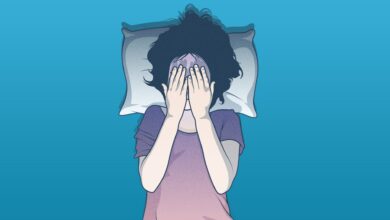The Role of Lifestyle in Insomnia Symptoms


Insomnia, characterized by difficulty falling asleep, staying asleep, or waking up too early and not being able to go back to sleep, is a pervasive sleep disorder affecting millions worldwide. While occasional sleeplessness is a common experience, chronic insomnia can severely impact a person’s quality of life. Lifestyle factors play a significant role in the onset and persistence of insomnia symptoms. Understanding and addressing these factors can be crucial in managing and alleviating insomnia.
The Impact of Lifestyle on Sleep Patterns
Several lifestyle habits directly affect sleep quality and can contribute to insomnia. These include irregular sleep schedules, poor diet, lack of exercise, excessive screen time, and stress management. Each of these factors can disrupt the natural sleep-wake cycle, making it difficult for individuals to achieve restful and restorative sleep.
- Irregular Sleep Schedules
Maintaining a consistent sleep schedule is vital for regulating the body’s internal clock, also known as the circadian rhythm. Irregular sleep patterns, such as going to bed and waking up at different times each day, can disrupt this rhythm, leading to difficulty falling asleep and poor sleep quality. People with erratic work hours or those who frequently travel across time zones are particularly vulnerable to developing insomnia.
- Diet and Nutrition
Diet significantly impacts sleep quality. Consuming caffeine or nicotine close to bedtime can stimulate the nervous system, making it difficult to fall asleep. Similarly, heavy or spicy meals late in the evening can cause discomfort and indigestion, interfering with sleep. Conversely, a diet rich in fruits, vegetables, and whole grains can promote better sleep. Certain foods, such as those high in magnesium and tryptophan, are known to have a calming effect and can aid in sleep.
- Physical Activity
Regular physical activity is beneficial for overall health and can also improve sleep quality. Exercise helps reduce stress and anxiety, which are common contributors to insomnia. However, the timing of exercise is crucial; engaging in vigorous physical activity close to bedtime can have the opposite effect, energizing the body and making it harder to fall asleep. Therefore, it’s recommended to complete exercise routines at least a few hours before going to bed.
- Screen Time and Exposure to Light
The prevalence of electronic devices in modern life has introduced a new challenge to healthy sleep patterns. The blue light emitted by screens on smartphones, tablets, and computers can suppress melatonin production, the hormone responsible for regulating sleep. Prolonged exposure to screens, especially before bedtime, can delay sleep onset and reduce sleep quality. Limiting screen time and using blue light filters in the evening can help mitigate these effects.
- Stress and Mental Health
Stress and anxiety are significant contributors to insomnia. High-stress levels can lead to a hyper-aroused state, making it difficult to relax and fall asleep. Chronic stress can perpetuate a cycle of poor sleep, as lack of sleep further exacerbates stress. Mindfulness practices, such as meditation, deep breathing exercises, and yoga, can help manage stress and improve sleep quality. Additionally, seeking professional help for underlying mental health issues is essential for those struggling with severe insomnia.
The Role of Lifestyle Modifications in Treating Insomnia
Addressing lifestyle factors through various modifications can be an effective strategy for treating insomnia. Behavioral therapies and lifestyle changes are often recommended before considering pharmacological interventions.
- Establishing a Regular Sleep Routine
Creating a consistent sleep schedule, even on weekends, can help regulate the circadian rhythm. Going to bed and waking up at the same time every day reinforces the body’s internal clock, making it easier to fall asleep and wake up naturally. This routine should be complemented by a relaxing pre-sleep ritual, such as reading, taking a warm bath, or listening to soothing music.
- Optimizing the Sleep Environment
The sleep environment plays a crucial role in sleep quality. Ensuring the bedroom is dark, quiet, and cool can promote better sleep. Investing in a comfortable mattress and pillows, and removing electronic devices from the bedroom, can create an optimal sleep environment. Additionally, using blackout curtains and white noise machines can help eliminate disturbances that might interfere with sleep.
- Dietary Adjustments
Making dietary changes can significantly impact sleep quality. Limiting caffeine and alcohol intake, especially in the hours leading up to bedtime, can prevent sleep disruptions. Incorporating sleep-promoting foods, such as nuts, seeds, and herbal teas like chamomile or valerian root, can enhance relaxation and facilitate sleep. Staying hydrated is also important, but it’s advisable to limit fluid intake close to bedtime to avoid frequent trips to the bathroom.
- Incorporating Regular Exercise
Regular physical activity is one of the most effective lifestyle changes for improving sleep. Exercise helps reduce anxiety and depressive symptoms, which are often linked to insomnia. Activities like walking, swimming, or cycling can be particularly beneficial. However, it’s important to time workouts appropriately, avoiding strenuous exercise within a few hours of bedtime to prevent it from interfering with sleep.
- Managing Stress and Practicing Relaxation Techniques
Effective stress management is crucial for alleviating insomnia. Incorporating relaxation techniques into daily routines can help reduce stress levels and promote better sleep. Practices such as progressive muscle relaxation, guided imagery, and mindfulness meditation can calm the mind and prepare the body for sleep. Establishing a wind-down period before bedtime, free from work or stimulating activities, can also be beneficial.
Seeking Professional Help
For individuals who continue to struggle with insomnia despite making lifestyle changes, seeking professional help is essential. Cognitive Behavioral Therapy for Insomnia (CBT-I) is a highly effective treatment that addresses the thoughts and behaviors contributing to insomnia. CBT-I involves techniques such as stimulus control, sleep restriction, and cognitive restructuring to promote healthier sleep patterns.
Additionally, healthcare providers can evaluate for underlying medical conditions or medication side effects that might be contributing to insomnia. In some cases, short-term use of sleep aids may be prescribed, but these are typically considered a last resort due to the potential for dependence and side effects.
Conclusion
Lifestyle factors play a pivotal role in the development and persistence of insomnia symptoms. By understanding and addressing these factors, individuals can take proactive steps to improve their sleep quality and overall well-being. Establishing a regular sleep routine, optimizing the sleep environment, making dietary adjustments, incorporating regular exercise, and managing stress through relaxation techniques are all effective strategies for managing insomnia. For those who continue to struggle, professional help through therapies like CBT-I can provide additional support and guidance. Ultimately, prioritizing healthy lifestyle choices is essential for achieving and maintaining restorative sleep.









